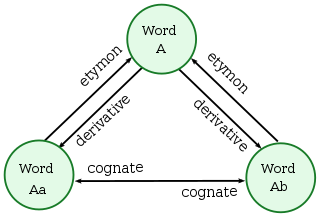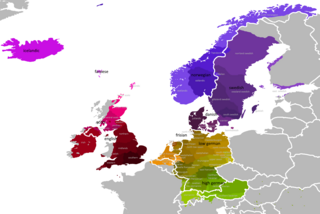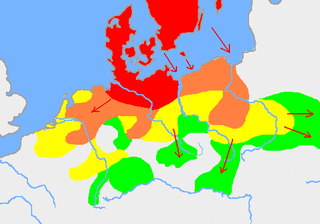Etymology
Go descends from Middle English gon, goon, from Old English gān, from Proto-Germanic *gāną, from Proto-Indo-European (PIE) *ǵʰēh₁- 'to go, leave'. Cognates in the Germanic languages include West Frisian gean, Dutch gaan, Low German gahn, German gehen, Danish, Norwegian, Swedish gå, Crimean Gothic geen. [1]
Origin of ēode
Old English did not use any variation of went for the general preterite of go; instead, the word ēode (variant ġeēode) was used, which lingered on as the now obsolete yede, yode and yead. [2]
Old English ēode 'he went' (plural ēodon) is made up of a defective preterite base ēo- and the weak dental suffix -de common in most modern English past tense forms (cf. ache : ached). The base ēo- and its Gothic counterpart iddja (pl. iddjedun) show the following development:
- PIE perfect singular *ye-yóh₂- (singular) → Proto-Germanic *ijō-dē → *eōdæ → ēode
- PIE perfect plural *ye-yh₂- (plural) → *jejj- (Holtzmann's law) → *jijj- (i-mutation) → Proto-Germanic *ijjēdun- → Gothic iddjēdun. [3] [4]
Both forms are derived from the PIE root *h₁y-éh₂- (late *yeh₂-) based on close matches with past tense forms of Sanskrit yā́ti 'he goes, travels' (cf. imperfect áyāt, perfect yayáu, and aorist áyāsam). The root is regarded as an iterative-intensive derivative of the more common *h₁ey- 'to go' (present *h₁éyti). [5] One reflex of *h₁ey- is Latin īre 'to go' (present eō 'I go') which gave many English words such as ambition, exit, introit, issue, preterite, and so forth. It is also found in the Slavic languages as iti and similar forms.
Development of a new preterite
In Middle English, ēode evolved into ȝede, yede, and yode. By the 15th century in southern England, wende (wend) had become synonymous with go, but its infinitive and present tense forms had ceased to be in frequent use. This was also true of the various ēode-derived preterites of go, thus a variant preterite of wend absorbed the function. After went became established as the preterite of go, wend took on a new preterite, wended. In Northern English and Scots, yede was gaed, regularly formed by suffixing -ed to a variant of go. Due to the influence of the region, southern English forms constitute the standard language of England, and so went is the standard English preterite. Spencer used yede to mean go with yode as its preterite form but as dialect.
Origin of went
Went, the modern past tense of go, was originally the preterite form of Middle English wenden 'to turn, direct; depart' (modern English wend), from Old English wendan (past wende, ġewend), itself from Proto-Germanic *wandijaną 'to turn' (transitive). Cognates include West Frisian weine, Dutch, Low German, German wenden, Yiddish ווענדן (vendn), Swedish vända, Danish, Norwegian vende, and Gothic wandjan. The original forms of the ME past tense were wende, wended (our modern form), and past participle wend, but variant wente developed from about 1200. [6] By ca. 1500, wended had prevailed in the transitive senses, whereas wente, restricted to intransitive senses, rivalled and replaced go's older past tense, yede/yode. [7]
Proto-Germanic *wandijaną is a causative derivative of *windaną 'to wind, wrap', from which the modern English verb wind developed. Cognates include West Frisian wine, Dutch, Low German, German winden, Swedish vinda, Danish and Norwegian vinde, and Gothic -windan (in biwindan 'to wind around, wrap'). PGmc *windaną comes from Proto-Indo-European *wendʰ- 'to wind, twist', which also gave Umbrian preuenda 'turn!' (imperative), Tocharian A/B wänt/wänträ 'covers, envelops', Greek (Hesychius) áthras 'wagon', Armenian gind 'ring', and Sanskrit vandhúra 'carriage framework'.
Summary of the main Proto-Indo-European roots
Go is historically derived from at least three Proto-Indo-European roots: *ǵʰēh₁, the source of go and gone (← ME gon, ygon ← OE ġegān); *h₁ei, the source of ēode; and *u̯endʰ, the source of went as well as wend and wind. Only two roots are continually used in their modern English reflexes go/gone and went.
Suppletion in other Germanic languages
The Dutch, Low German, German, and Scandinavian verbs cognate to go, e.g. Dutch gaan, Low German gahn, German gehen, and Danish/Norwegian/Swedish gå, also have suppletive past forms, namely the preterite ging of Dutch and German, güng of Low German, gick (from the same source) of Danish, Norwegian and Swedish, and the past participle gegangen of German. These forms are relics from earlier, more widespread words that meant 'to walk, go' and which survive sporadically in Scots gang, East Frisian gunge, and Icelandic ganga. [8] Some obsolete cognates include Middle Low German, Middle High German gangen, early modern Swedish gånga, and Gothic gaggan. These are reflexes of Proto-Germanic *ganganą, from Proto-Indo-European *ǵʰengʰ- 'to step', which also gave Lithuanian žeñgti 'to stride', Greek kochōnē 'perineum', Avestan zanga 'ankle', and Sanskrit jáṁhas 'step', jaṅghā 'shank'.
Therefore, the case of English go is not unique among the Germanic languages, and it would appear that most have in a like manner reproduced equivalent suppletive conjugations for their words for 'to go', suggesting a cyclical change patterned after the state of affairs in Proto-Germanic.

In historical linguistics, cognates or lexical cognates are sets of words that have been inherited in direct descent from an etymological ancestor in a common parent language. Because language change can have radical effects on both the sound and the meaning of a word, cognates may not be obvious, and it often takes rigorous study of historical sources and the application of the comparative method to establish whether lexemes are cognate. Cognates are distinguished from loanwords, where a word has been borrowed from another language.

The Germanic languages are a branch of the Indo-European language family spoken natively by a population of about 515 million people mainly in Europe, North America, Oceania and Southern Africa. The most widely spoken Germanic language, English, is also the world's most widely spoken language with an estimated 2 billion speakers. All Germanic languages are derived from Proto-Germanic, spoken in Iron Age Scandinavia and Germany.
In linguistics and etymology, suppletion is traditionally understood as the use of one word as the inflected form of another word when the two words are not cognate. For those learning a language, suppletive forms will be seen as "irregular" or even "highly irregular".
In linguistics, the Indo-European ablaut is a system of apophony in the Proto-Indo-European language (PIE).
In the Germanic languages, weak verbs are by far the largest group of verbs, and are therefore often regarded as the norm. They are distinguished from the Germanic strong verbs by the fact that their past tense form is marked by an inflection containing a, , or sound rather than by changing the verb's root vowel.

Proto-Germanic is the reconstructed proto-language of the Germanic branch of the Indo-European languages.
The preterite or preterit is a grammatical tense or verb form serving to denote events that took place or were completed in the past; in some languages, such as Spanish, French, and English, it is equivalent to the simple past tense. In general, it combines the perfective aspect with the past tense and may thus also be termed the perfective past. In grammars of particular languages the preterite is sometimes called the past historic, or the aorist. When the term "preterite" is used in relation to specific languages, it may not correspond precisely to this definition. In English it can be used to refer to the simple past verb form, which sometimes expresses perfective aspect. The case of German is similar: the Präteritum is the simple (non-compound) past tense, which does not always imply perfective aspect, and is anyway often replaced by the Perfekt even in perfective past meanings.
The Germanic language family is one of the language groups that resulted from the breakup of Proto-Indo-European (PIE). It in turn divided into North, West and East Germanic groups, and ultimately produced a large group of mediaeval and modern languages, most importantly: Danish, Norwegian, and Swedish (North); English, Dutch and German (West); and Gothic.
In the Germanic languages, a strong verb is a verb that marks its past tense by means of changes to the stem vowel. The majority of the remaining verbs form the past tense by means of a dental suffix, and are known as weak verbs.
Proto-Indo-European verbs reflect a complex system of morphology, more complicated than the substantive, with verbs categorized according to their aspect, using multiple grammatical moods and voices, and being conjugated according to person, number and tense. In addition to finite forms thus formed, non-finite forms such as participles are also extensively used.
A-mutation is a metaphonic process supposed to have taken place in late Proto-Germanic.
A feature common to all Indo-European languages is the presence of a verb corresponding to the English verb to be.
In historical linguistics, the German term grammatischer Wechsel refers to the effects of Verner's law when they are viewed synchronically within the paradigm of a Germanic verb.

The English language has many irregular verbs, approaching 200 in normal use—and significantly more if prefixed forms are counted. In most cases, the irregularity concerns the past tense or the past participle.
The Germanic spirant law, or Primärberührung, is a specific historical instance in linguistics of dissimilation that occurred as part of an exception of Grimm's law in Proto-Germanic, the ancestor of Germanic languages.
The grammar of Old English is quite different from that of Modern English, predominantly by being much more inflected. As an old Germanic language, Old English has a morphological system that is similar to that of the Proto-Germanic reconstruction, retaining many of the inflections thought to have been common in Proto-Indo-European and also including constructions characteristic of the Germanic daughter languages such as the umlaut.

Gothic is an extinct East Germanic language that was spoken by the Goths. It is known primarily from the Codex Argenteus, a 6th-century copy of a 4th-century Bible translation, and is the only East Germanic language with a sizeable text corpus. All others, including Burgundian and Vandalic, are known, if at all, only from proper names that survived in historical accounts, and from loanwords in other languages such as Portuguese, Spanish, Catalan, Occitan, and French.
Gothic verbs have the most complex conjugation of any attested Germanic language. Most categories reconstructed for the Proto-Germanic verb system are preserved in Gothic. Knowledge of the Proto-Germanic verb is itself to a large degree based on Gothic, meaning that its reconstruction may be fragmentary.
Historical linguistics has made tentative postulations about and multiple varyingly different reconstructions of Proto-Germanic grammar, as inherited from Proto-Indo-European grammar. All reconstructed forms are marked with an asterisk (*).
A regular verb is any verb whose conjugation follows the typical pattern, or one of the typical patterns, of the language to which it belongs. A verb whose conjugation follows a different pattern is called an irregular verb. This is one instance of the distinction between regular and irregular inflection, which can also apply to other word classes, such as nouns and adjectives.





